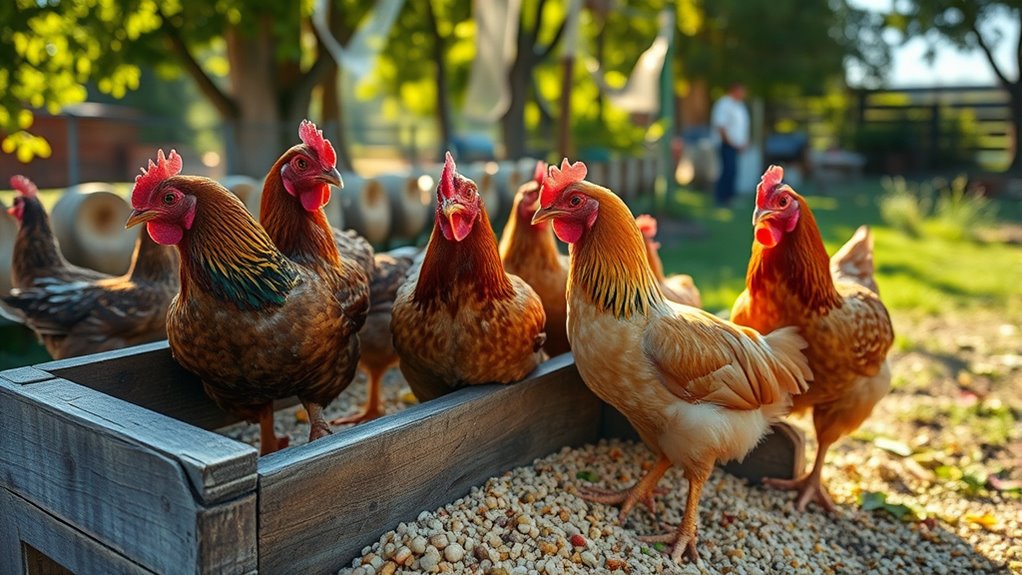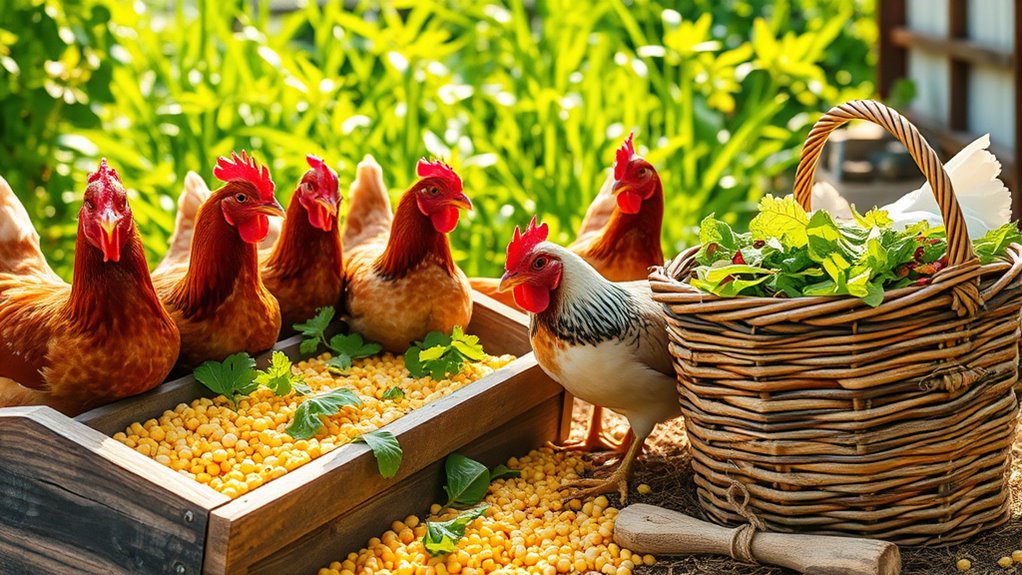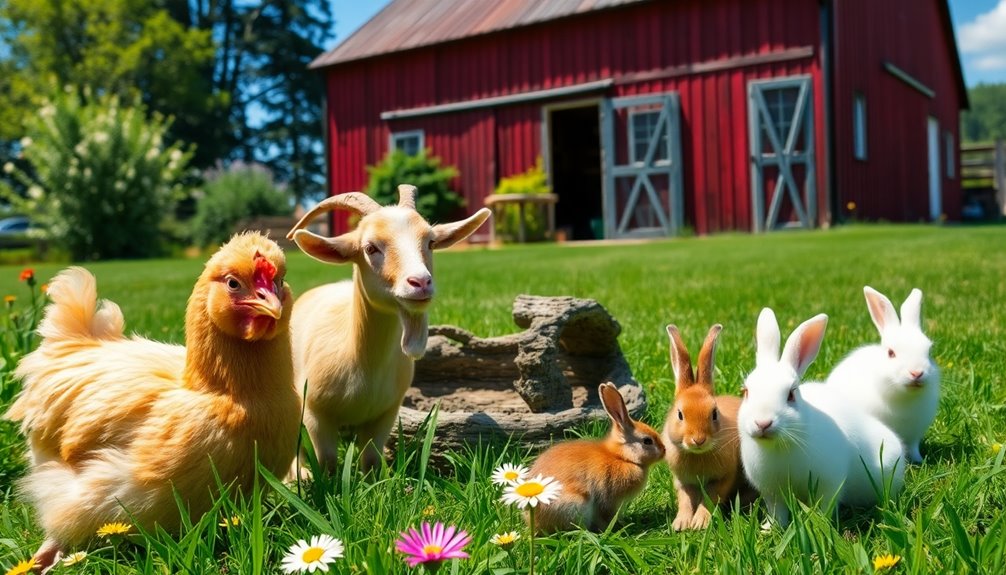Feeding chickens naturally and affordably is simple when you focus on wholesome, homemade treats and organic supplements. Use kitchen scraps like vegetable peels and leftover grains, and grow herbs such as basil or mint to boost their health naturally. Scattering treats encourages foraging and keeps your flock active. Incorporating organic calcium sources like crushed eggshells improves eggshell strength. Keep your diet varied, and you’ll enjoy healthier birds and better eggs—discover more ways to enrich their diet.
Key Takeaways
- Use organic, natural foods like crushed eggshells, seaweed, and fermented grains to boost nutrition affordably.
- Prepare homemade treats from kitchen scraps such as vegetable peels and leftover grains to reduce costs and waste.
- Cultivate backyard herbs like basil, mint, and oregano to provide fresh, cost-effective supplements with health benefits.
- Scatter treats to encourage foraging, promoting natural behavior and balanced nutrition at low expense.
- Avoid chemicals and artificial additives by choosing natural supplements, supporting healthier flock and eggs at an affordable price.

Feeding chickens naturally is a simple way to promote healthier birds and better-quality eggs. When you focus on providing wholesome, natural foods, you support their immune system and overall well-being. One effective approach is incorporating organic supplements into their diet. These supplements are made from natural ingredients without harmful chemicals or artificial additives, guaranteeing your flock gets essential nutrients in a pure form. Organic options like crushed eggshells, seaweed, or fermented grains can boost their calcium intake and improve eggshell strength. By choosing organic supplements, you’re not only promoting their health but also aligning with an eco-friendly and sustainable lifestyle.
In addition to organic supplements, offering homemade treats is an excellent way to enhance your chickens’ diet naturally and affordably. Homemade treats are easy to prepare and can be tailored to your flock’s specific needs. For example, you can make healthy snacks using kitchen scraps like vegetable peels, cooked grains, or leftover fruits. Not only does this reduce waste, but it also provides your chickens with a variety of nutrients that commercial feeds may lack. These treats help keep your birds engaged and active, which is crucial for their physical and mental health.
Feeding chickens naturally doesn’t mean sacrificing convenience; instead, it involves making smarter choices about what you give them. You can blend organic supplements into their regular feed or scatter homemade treats throughout their enclosure to encourage foraging behavior. This natural foraging not only stimulates their instincts but also promotes a more balanced diet. Additionally, ensuring proper nutrition by offering a variety of foods helps prevent deficiencies and supports their overall health. Healthy foraging habits can also reduce feed costs and promote natural behaviors that keep your flock active and content. Incorporating nutrient-rich foods such as leafy greens can further enhance their health and egg production. Remember, moderation is key, so avoid overfeeding treats that are high in sugar or fat. Balance is essential for maintaining their health and egg production.
Another cost-effective tip is growing your own treats. Herbs like basil, mint, or oregano can be cultivated easily in your backyard and added fresh to their diet. These herbs contain natural antioxidants and can help boost immunity. Plus, they’re inexpensive and readily available, making them a sustainable addition to your feeding routine. Incorporating proper nutrition and a diverse diet helps ensure your chickens stay healthy and productive. Combining these fresh herbs with organic supplements and homemade treats creates a diverse diet that keeps your chickens happy and healthy without breaking the bank.
Frequently Asked Questions
Can Chickens Eat Kitchen Scraps Safely?
Chickens can safely eat kitchen scraps if you feed them vegetables and avoid processed foods. You should cut scraps into manageable pieces and steer clear of anything moldy, salty, or greasy. Feeding vegetables like carrot tops or leafy greens provides nutrients, but avoid giving them anything harmful like onions or citrus. By sticking to fresh, natural kitchen scraps, you guarantee your chickens stay healthy and happy while keeping their diet affordable.
How Do I Prevent Pests From Chicken Feed?
Imagine your chicken feed as a tempting treasure chest, but pests are enthusiastic thieves. To keep them out, use pest-resistant feeders that block access and prevent spillage. Incorporate natural pest deterrents like planting marigolds nearby or spreading diatomaceous earth around feeders. Keep feed in airtight containers, and clean up spills promptly. These steps create a fortress around your feed, ensuring your hens stay healthy and pests stay at bay.
What Are the Signs of Nutritional Deficiencies?
You’ll notice signs of nutritional deficiencies when your chickens show symptoms like dull feathers, poor growth, or decreased egg production. Vitamin deficiencies can cause issues like ruffled feathers or weakness, while mineral imbalances might lead to leg deformities or shell problems. Keep an eye on their behavior and appearance; these signs indicate your flock may need a balanced diet to prevent deficiencies and promote overall health.
How Often Should I Rotate Free-Range Areas?
You should rotate your chickens’ free-range areas regularly to promote healthy pasture management and prevent overgrazing. A good rule of thumb is to move them every 1 to 2 weeks, depending on pasture condition. This rotating schedule helps maintain fresh forage, reduces parasite buildup, and keeps your chickens healthy. Keep an eye on pasture health and adjust your schedule accordingly to guarantee sustainable and natural feeding for your flock.
Are There Affordable Natural Supplements for Chickens?
You’re wondering if there are affordable natural supplements for chickens. Absolutely! Herbal remedies like thyme, oregano, and garlic can boost your flock’s health naturally. Mineral supplements such as crushed eggshells or oyster shells help provide essential calcium. These options are budget-friendly, easy to add to their daily diet, and support overall health without relying on costly commercial feeds. Incorporating herbal remedies and mineral supplements is a smart way to keep your chickens thriving naturally.
Conclusion
Think of nourishing your chickens as tending a delicate garden—each natural, affordable feed is a seed that nurtures their health and vitality. When you choose to feed them naturally, you’re planting the roots of a thriving flock, watered by your care and attention. Just like a garden flourishes with patience and love, your chickens will reward you with eggs and joy, flourishing under your mindful stewardship. Keep nurturing them, and watch your farm bloom in abundance.










